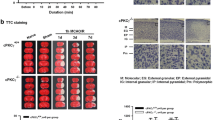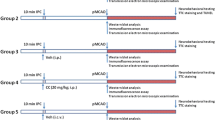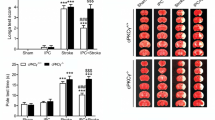Abstract
Autophagy, an important intracellular degradation pathway, has been reported to clear impaired mitochondria and reduce mitochondria-mediated injury in ischemic disease. Our study and other recent investigations have shown that AKT-dependent autophagy contributes to the neuroprotection afforded by limb remote ischemic conditioning (RIC) in experimental stroke. However, how AKT triggers RIC-based autophagy and whether RIC-afforded autophagy is beneficial for mitochondrial function after cerebral ischemia remains unclear. The disruption of the Bcl-2/Beclin1 complex has been reported to trigger autophagy formation in the condition of Bcl-2 phosphorylation at Ser70. We investigated whether Bcl-2 phosphorylation triggers RIC-based autophagy and thereby confers RIC-induced neuroprotection against mitochondrial injury, using a transient cerebral ischemic rat model. We demonstrated that rats undergoing RIC treatment 30 min after the onset of ischemia (I-30) and at reperfusion (R-0) significantly upregulated Bcl-2 phosphorylation. Immunoprecipitation revealed that RIC increased dissociation of the Bcl-2/Beclin1 complex, leading to a higher level of autophagy than in ischemia/reperfusion rats. Furthermore, AKT activation was shown to play a critical role in regulating Bcl-2-mediated autophagy, as an AKT inhibitor (LY294002, AKTi) administered 30 min prior to ischemia significantly suppressed Bcl-2 phosphorylation and Bcl-2/Beclin1 complex dissociation, thereby reducing autophagy in RIC rats. Blocking Bcl-2 phosphorylation-dependent autophagy with AKTi suppressed RIC-afforded protection on mitochondrial potential and mitochondrial-dependent cell death effector pathway. These findings indicate that Bcl-2 phosphorylation and thereby Bcl-2/Beclin1 complex disruption play a crucial role in triggering autophagy and reducing mitochondrial damage in RIC rats after cerebral ischemia and require the involvement of the AKT activation.






Similar content being viewed by others
References
Chen F, Qi Z, Luo Y, Hinchliffe T, Ding G, Xia Y, et al. Non-pharmaceutical therapies for stroke: mechanisms and clinical implications. Prog Neurobiol. 2014;115:246–69.
Meng R, Asmaro K, Meng L, Liu Y, Ma C, Xi C, et al. Upper limb ischemic preconditioning prevents recurrent stroke in intracranial arterial stenosis. Neurology. 2012;79:1853–61.
Sun J, Tong L, Luan Q, Deng J, Li Y, Li Z, et al. Protective effect of delayed remote limb ischemic postconditioning: role of mitochondrial K(ATP) channels in a rat model of focal cerebral ischemic reperfusion injury. J Cereb Blood Flow Metab. 2012;32:851–9.
Hoda MN, Siddiqui S, Herberg S, Periyasamy-Thandavan S, Bhatia K, Hafez SS, et al. Remote ischemic perconditioning is effective alone and in combination with intravenous tissue-type plasminogen activator in murine model of embolic stroke. Stroke. 2012;43:2794–9.
Hahn CD, Manlhiot C, Schmidt MR, Nielsen TT, Redington AN. Remote ischemic per-conditioning: a novel therapy for acute stroke? Stroke. 2011;42:2960–2.
Qi ZF, Luo YM, Liu XR, Wang RL, Zhao HP, Yan F, Song ZJ, Luo M, Ji XM. AKT/GSK3beta-dependent autophagy contributes to the neuroprotection of limb remote ischemic postconditioning in the transient cerebral ischemic rat model. CNS Neurosci Ther. 2012;28:965–73.
Zhao H. Ischemic postconditioning as a novel avenue to protect against brain injury after stroke. J Cereb Blood Flow Metab. 2009;29:873–85.
Hougaard KD, Hjort N, Zeidler D, Sorensen L, Norgaard A, Hansen TM, et al. Remote ischemic perconditioning as an adjunct therapy to thrombolysis in patients with acute ischemic stroke: a randomized trial. Stroke. 2014;45:159–67.
Choi AM, Ryter SW, Levine B. Autophagy in human health and disease. N Engl J Med. 2013;368:651–62.
Levine B, Mizushima N, Virgin HW. Autophagy in immunity and inflammation. Nature. 2011;469:323–35.
Cheong H, Lu C, Lindsten T, Thompson CB. Therapeutic targets in cancer cell metabolism and autophagy. Nat Biotechnol. 2012;30:671–8.
Metcalf DJ, Garcia-Arencibia M, Hochfeld WE, Rubinsztein DC. Autophagy and misfolded proteins in neurodegeneration. Exp Neurol. 2012;238:22–8.
Moran M, Moreno-Lastres D, Marin-Buera L, Arenas J, Martin MA, Ugalde C. Mitochondrial respiratory chain dysfunction: implications in neurodegeneration. Free Radic Biol Med. 2012;53:595–609.
Levine B, Sinha S, Kroemer G. Bcl-2 family members: dual regulators of apoptosis and autophagy. Autophagy. 2008;4:600–6.
Sun K, Xie X, Liu Y, Han Z, Zhao X, Cai N, et al. Autophagy lessens ischemic liver injury by reducing oxidative damage. Cell Biosci. 2013;3:26.
Zhang X, Yan H, Yuan Y, Gao J, Shen Z, Cheng Y, et al. Cerebral ischemia-reperfusion-induced autophagy protects against neuronal injury by mitochondrial clearance. Autophagy. 2013;9:1321–33.
Mei Y, Thompson MD, Cohen RA, Tong X. Autophagy and oxidative stress in cardiovascular diseases. Biochim Biophys Acta. 2015;1852:243–51.
Qi Z, Yang W, Liu Y, Cui T, Gao H, Duan C, et al. Loss of PINK1 function decreases PP2A activity and promotes autophagy in dopaminergic cells and a murine model. Neurochem Int. 2011;59:572–81.
Glick D, Barth S, Macleod KF. Autophagy: cellular and molecular mechanisms. J Pathol. 2010;221:3–12.
Kubota C, Torii S, Hou N, Saito N, Yoshimoto Y, Imai H, et al. Constitutive reactive oxygen species generation from autophagosome/lysosome in neuronal oxidative toxicity. J Biol Chem. 2010;285:667–74.
Wang P, Guan YF, Du H, Zhai QW, Su DF, Miao CY. Induction of autophagy contributes to the neuroprotection of nicotinamide phosphoribosyltransferase in cerebral ischemia. Autophagy. 2012;8:77–87.
Maiuri MC, Zalckvar E, Kimchi A, Kroemer G. Self-eating and self-killing: crosstalk between autophagy and apoptosis. Nat Rev Mol Cell Biol. 2007;8:741–52.
Maiuri MC, Criollo A, Tasdemir E, Vicencio JM, Tajeddine N, Hickman JA, et al. BH3-only proteins and BH3 mimetics induce autophagy by competitively disrupting the interaction between Beclin 1 and Bcl-2/Bcl-X(L). Autophagy. 2007;3:374–6.
Wei Y, Pattingre S, Sinha S, Bassik M, Levine B. JNK1-mediated phosphorylation of Bcl-2 regulates starvation-induced autophagy. Mol Cell. 2008;30:678–88.
Srinivasan S, Avadhani NG. Cytochrome c oxidase dysfunction in oxidative stress. Free Radic Biol Med. 2012;53:1252–63.
Tait SW, Green DR. Mitochondria and cell death: outer membrane permeabilization and beyond. Nat Rev Mol Cell Biol. 2010;11:621–32.
Acknowledgments
This work was supported by grants from the National Natural Science Foundation of China (81271461, 30770743, 81200928), Beijing Nova Program (Z141107001814045), and Beijing Nature Science Foundation (7111003).
Conflict of Interest
Zhifeng Qi, Wen Dong, Wenjuan Shi, Rongliang Wang, Chencheng Zhang, Yongmei Zhao, Xunming Ji, Ke Jian Liu, and Yumin Luo have no financial conflicts of interest to declare.
Author information
Authors and Affiliations
Corresponding authors
Rights and permissions
About this article
Cite this article
Qi, Z., Dong, W., Shi, W. et al. Bcl-2 Phosphorylation Triggers Autophagy Switch and Reduces Mitochondrial Damage in Limb Remote Ischemic Conditioned Rats After Ischemic Stroke. Transl. Stroke Res. 6, 198–206 (2015). https://doi.org/10.1007/s12975-015-0393-y
Received:
Revised:
Accepted:
Published:
Issue Date:
DOI: https://doi.org/10.1007/s12975-015-0393-y




